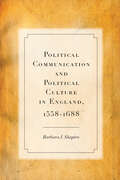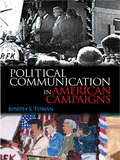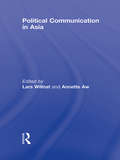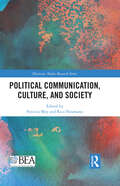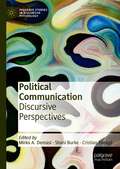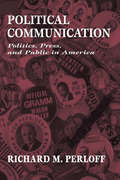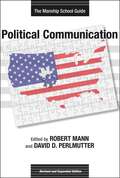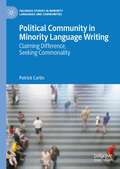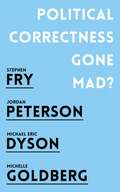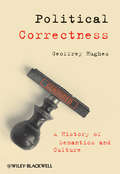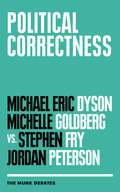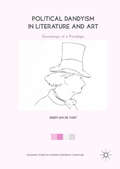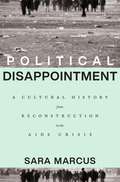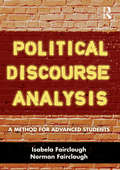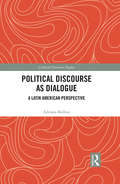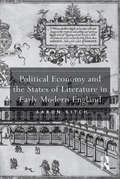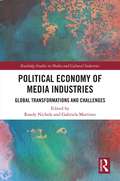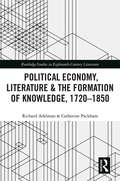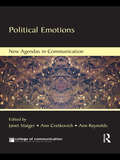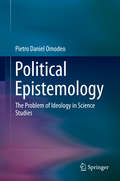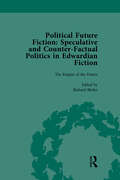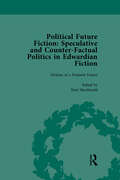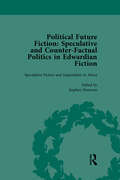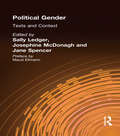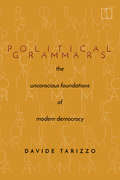- Table View
- List View
Political Communication and Political Culture in England, 1558-1688
by Barbara J. ShapiroThis book surveys the channels through which political ideas and knowledge were conveyed to the English people from the beginning of the reign of Elizabeth I to the Revolution of 1688. Shapiro argues that an assessment of English political culture requires an examination of all means by which this culture was expressed and communicated. While the discussion focuses primarily on genres such as the sermon, newsbook, poetry, and drama, it also considers the role of events and institutions. Shapiro is the first to explore and elucidate the entire web of communication in early modern English political life.
Political Communication in American Campaigns
by Joseph S. TumanIn Political Communication in American Campaigns, Joseph S. Tuman provides a comprehensive, clear, and accessible treatment of American campaign rhetoric and argues that modern elections are not really about contests between candidates or political parties; rather, they are more about the competing messages each player in the political process must present to persuade and reach voters.. This book′s triangulated approach to political communication includes (1) all forms of campaign speech and oratory; (2) the rhetorical dimensions of campaign debates; and (3) candidate/campaign interaction with mass media. Key Features Allows readers to deconstruct and understand how and why speeches affect voters: Offers methods for understanding how political speeches are constructed and targeted, as well as how to apply these methodologies to a variety of campaign oratories. Provides a comprehensive and entertaining explanation of the history of campaign debates in the United States: A historical description of the evolution of political campaign helps situate modern debates within the context of specific mass media strategies and tactics employed by campaigns. Reflects how changes in mass media have now influenced how campaigns communicate messages to voters: Explores the relationship between campaigns and mass media, with an emphasis on paid and free media, and addresses the contemporary intersection of campaign Web sites and blogs with campaign main messages, fundraising, manipulating news coverage and creating ads. Offers an insider′s view of how campaigns work—and how news media coverage of campaigns works: The book is written with additional insights from the author′s experiences as a political consultant and as a political analyst for news media. Presents contemporary examples that all readers will understand: Real-life case studies of debates from both state and national elections; all forms of campaign oratories; and mass mediated campaigns. Intended Audience This text is designed for advanced courses dealing with such topics as political communication, media & politics, presidential rhetoric, and persuasion, as found in departments of communication, media studies, and political science.
Political Communication in Asia (Routledge Communication Series #23)
by Lars Willnat Annette AwThis edited volume provides a critical review of political communication research conducted in Asia over the past twenty years. Each chapter focuses on studies published in a specific Asian country, selected according to the level of contribution made to the field of political communication in Asia. Covering China, Hong Kong, Taiwan, South Korea, Japan, Singapore, Malaysia, Indonesia, and India, the book’s primary objective is to review the unique theoretical accomplishments made by Asian communication scholars, thus contributing to a better awareness and understanding of political communication research in Asia. The contributors are well-respected Asian media scholars writing on political communication in their countries of origin. Each author reviews studies conducted and published in his/her native country and language(s). This book provides a first review of these studies, most of which have never been published in English, and makes them available to international scholars. The contributors discuss each country’s political background, and address the findings and conclusions of the political communication studies conducted in their respective countries during the past two decades. The chapters focus on insights that have been made by adapting Western media theories to the unique social, cultural, or political contexts that exist in each country. The authors also point out possible gaps in the current research within their respective countries and to make recommendations for future studies.
Political Communication, Culture, and Society (Electronic Media Research Series)
by Patricia Moy Rico NeumannAs an installment of Routledge’s Broadcast Education Association (BEA) Electronic Media Research Series, Political Communication, Culture, and Society focuses on the expansive concept of political communication and illuminates the processes, contents, and effects related to myriad forms and vehicles of political communication. Whether involving traditional print or broadcast media, social media platforms, or face-to-face discussions, political communication today has shaped how we perceive others and understand the world around us, including our place in it, and ultimately, how we engage with others as social, cultural, and political beings.Hailing from multiple locations and drawing on a multitude of theories as well as quantitative and qualitative methodologies, the volume’s contributors examine how communication intersects with politics in a broad swath of contexts, ranging from climate change to migration to the notion of political correctness. Collectively they ask and answer questions about how today’s richly textured media ecology shapes our political world and how political messages can fuel – and ameliorate – the issues that deeply cleave societies around the globe.Relevant to scholars and students of journalism, media studies, and communication sciences, this volume will help interested readers better understand today’s increasingly complex sociocultural world through the lens of political communication.
Political Communication: Discursive Perspectives (Palgrave Studies in Discursive Psychology)
by Cristian Tileagă Mirko A. Demasi Shani BurkeThis book explores discursive psychological empirical research in the context of political communication. Drawing together a well-established field of study and a variety of discursive psychology approaches the authors confront the theoretical and practical challenges that discursive psychology and political communication studies face today. Using a diverse range of approaches, including the analysis of TV shows, cartoons, social media groups and blogs, face-to-face verbal interaction, political rhetoric and mainstream news reports, the authors explain the ways in which discursive psychology can offer insight into the nature of contemporary political communications. The book offers timely and international reflections on the context of online political communication, Brexit rhetoric, prejudice discourse and political persuasion, showcasing the analytical acumen and empirical insight that can be gleaned from discursive psychology methods.Political Communication: Discursive Perspectives highlights the value of contributions from outside English speaking academia and is essential reading for academics, researchers and students interested in political communication or discursive psychology.
Political Communication: Politics, Press, and Public in America (Routledge Communication Series)
by Richard M. PerloffIn this political communication text, Richard M. Perloff examines the various ways in which messages are constructed and communicated from public officials and politicians through the mass media to the ultimate receivers-the people. With a focus on the history of political communication, he provides an overview of the most significant issues in the study of politics and the media. In addition to synthesizing facts and theories, and highlighting the scholarly contributions made to the understanding of political communication effects, Political Communication addresses such factors as the rhetorical accomplishments of American presidents, the ongoing tangles between the press and the presidency, and the historical roots of politics as it is practiced and studied today. It also addresses major issues about the press and politics that continually resurface, such as question of press bias and the use and manipulation of media by politicians to accomplish national goals. As a comprehensive and engaging introduction to contemporary political communication, this volume provides all readers with a historical perspective on American politics and press and offers a unique appreciation of the strengths and virtues of political communication in America.
Political Communication: The Manship School Guide (Media & Public Affairs #7)
by Robert Mann David Schultz David D. Perlmutter Wayne Parent Kirby Goidel Charlie Cook Monica Ancu Robert H. Binstock Louis Day Thomas Edmonds Malcom P. Ehrhardt William B. Fletcher John Franzen Ronald Garay Paul Harang Bud Jackson Lynda L. Kaid Katie Knobloch David D. Kurpius Lisa Lundy Melissa Michelson Trevor Parry-Giles Sean Reilly Dane Strother Gerry Tyson Darrell West Michael XenosA new era of political power has arrived, one in which the social media forces of Facebook, YouTube, and Twitter indisputably play a larger role in the political process. In this revised and expanded edition of Political Communication: The Manship School Guide, edited by Robert Mann and David D. Perlmutter, contributors discuss technological changes in the context of studies and techniques that remain unchallenged, resulting in a truly comprehensive manual of the world of political communication. This shift in communication began with Howard Dean's social media interaction between voters and candidates. Later, Barack Obama redefined these techniques during his march to the White House. This intriguing development in political campaigns focuses the impact of social media on political consultation and communication, and this volume provides an up-to-date and peerless guide to the events, methods, technologies, venues, theories, and applications of political dialogues.More than just a how-to primer, this new edition also expertly explains the process behind the political engine. Political Communication: The Manship School Guide includes individual essays that tackle the growing myths revolving around politics, such as the political money-monster and the "Mr. Smith Goes to Washington"--candidate fantasy.Twenty-seven chapters from a variety of contributors -- including academics, journalists, and political professionals -- provide insightful, astute, and critical essays for a deeper understanding of political communication and the many roles the public has played in twenty-first-century politics.With this second edition, Political Communication: The Manship School Guide offers readers a valuable resource that clarifies the confusing world of politics.
Political Community in Minority Language Writing: Claiming Difference, Seeking Commonality (Palgrave Studies in Minority Languages and Communities)
by Patrick CarlinThis book offers case studies and a comparative analysis of three authors writing in different European minority languages, exploring how they link national and context-marked political community with universal human requirements. The author examines their left-wing positions and how their writing speaks to the acceptance of difference as a necessary condition of such universal values. He presents, for the first time in English, an in-depth treatment of the writing of the Basque poet, novelist and essayist Joseba Sarrionandia (1958–) and the Catalan priest and civil disobedience author and activist Lluís Maria Xirinacs (1932–2007), whilst linking their understanding of a 'foundational universalism' with the work of Irish novelist, short-story writer and language activist Máirtín Ó Cadhain (1906–1970). The book is by its nature interdisciplinary in order to engage in a thoroughgoing comparative analysis of European language minorities, and responds empirically and theoretically to calls made recently in this regard from within critical Iberian Studies. It will therefore be of interest to students and scholars of fields such as Iberian and Celtic studies, International Relations theory, literary criticism, nationalism studies, political philosophy, as well as socio-legal and critical terrorism studies.
Political Correctness Gone Mad?
by Stephen Fry Michelle Goldberg Michael Dyson Jordan Peterson&‘Without free speech there is no true thought.&’ –Jordan Peterson &‘If you&’re white, this country is one giant safe space.&’ –Michael Eric Dyson The Munk debate on political correctness Is political correctness an enemy of free speech, sparking needless conflict? Or is it a weapon in the fight for equality, restoring dignity to the downtrodden? How should we talk about the things that matter most in an era of rapid social change? Four thinkers take on one of the most heated debates in the culture wars of the twenty-first century.
Political Correctness: A History of Semantics and Culture (The Language Library #24)
by Geoffrey HughesIn this carefully researched, thought-provoking book, Geoffrey Hughes examines the trajectory of political correctness and its impact on public life. Focusing on the historical, semantic, and cultural aspects of political correctness, it will intrigue anyone interested in this ongoing debate. A unique and intriguing journey through the trajectory of political correctness and its impact on public life, focusing on the historical, semantic, and cultural aspects of what PC means Explores the origins, progress, content and style of political correctness, discussing and analyzing around one hundred terms and lexical formations, from Chaucer and Shakespeare, Marlowe and Swift, to nursery rhymes, rap and Spike Lee films, David Mamet, J. M. Coetzee and Philip Larkin Offers a detailed semantic analysis of the way that key words have been exploited both to advance the agendas of political correctness and to refute them
Political Correctness: The Munk Debates (The Munk Debates #2018)
by Stephen Fry Michelle Goldberg Michael Dyson Jordan PetersonThe twenty-second Munk Debate pits acclaimed journalist, professor, and ordained minister Michael Eric Dyson and New York Times columnist Michelle Goldberg against renowned actor and writer Stephen Fry and University of Toronto professor and author Jordan Peterson to debate the implications of political correctness and freedom of speech.Is political correctness an enemy of free speech, open debate, and the free exchange of ideas? Or, by confronting head-on the dominant power relationships and social norms that exclude marginalized groups are we creating a more equitable and just society? For some the argument is clear. Political correctness is stifling the free and open debate that fuels our democracy. It is also needlessly dividing one group from another and promoting social conflict. Others insist that creating public spaces and norms that give voice to previously marginalized groups broadens the scope of free speech. The drive towards inclusion over exclusion is essential to creating healthy, diverse societies in an era of rapid social change.
Political Dandyism in Literature and Art: Genealogy of a Paradigm (Palgrave Studies in Modern European Literature)
by Geertjan De VugtThis book traces a genealogy of political dandyism in literature. Dandies abstain from worldly affairs, and politics in particular. As an enigmatic figure, or a being of great eccentricity, it was the dandy that haunted the literary and cultural imagination of the nineteenth century. In fact, the dandy is often seen as a quintessential nineteenth-century figure. It was surprising, then, when at the beginning of the twenty-first century this figure returned from the past to an unexpected place: the very heart of European politics. Various so-called populist leaders were seen as political dandies. But how could that figure that was once known for its aversion towards politics all of a sudden become the protagonist of a new political paradigm? Or was the dandy perhaps always already part of a political imagination? This study charts the emergence of this political paradigm. From the dandy’s first appearance to his latest resurrection, from Charles Baudelaire to Jean-François Lyotard, from dandy-insects to a dandy-Christ, this book follows his various guises and disguises.
Political Disappointment: A Cultural History from Reconstruction to the AIDS Crisis
by Sara Marcus“Political Disappointment is an abundant text, overflowing with Sara Marcus’s considerable gifts. She is adept at presenting history and narrative with equal clarity; her writing is urgent but also optimistic. This is a book that is sometimes painful but never sacrifices hope or beauty.”—Hanif AbdurraqibMoving from the aftermath of Reconstruction through the AIDS crisis, a new cultural history of the United States shows how artists, intellectuals, and activists turned political disappointment—the unfulfilled desire for change—into a basis for solidarity.Sara Marcus argues that the defining texts in twentieth-century American cultural history are records of political disappointment. Through insightful and often surprising readings of literature and sound, Marcus offers a new cultural history of the last century, in which creative minds observed the passing of moments of possibility, took stock of the losses sustained, and fostered intellectual revolutions and unexpected solidarities.Political Disappointment shows how, by confronting disappointment directly, writers and artists helped to produce new political meanings and possibilities. Marcus first analyzes works by W. E. B. Du Bois, Charles Chesnutt, Pauline Hopkins, and the Fisk Jubilee Singers that expressed the anguish of the early Jim Crow era, during which white supremacy thwarted the rebuilding of the country as a multiracial democracy. In the ensuing decades, the Popular Front work songs and stories of Lead Belly and Tillie Olsen, the soundscapes of the civil rights and Black Power movements, the feminist poetry of Audre Lorde and Adrienne Rich, and the queer art of Marlon Riggs and David Wojnarowicz continued building the century-long archive of disappointment. Marcus shows how defeat time and again gave rise to novel modes of protest and new forms of collective practice, keeping alive the dream of a better world.Disappointment has proved to be a durable, perhaps even inevitable, feature of the democratic project, yet so too has the resistance it precipitates. Marcus’s unique history of the twentieth century reclaims the unrealized desire for liberation as a productive force in American literature and life.
Political Discourse Analysis: A Method for Advanced Students
by Norman Fairclough Isabela FaircloughIn this accessible new textbook, Isabela and Norman Fairclough present their innovative approach to analysing political discourse. Political Discourse Analysis integrates analysis of arguments into critical discourse analysis and political discourse analysis. The book is grounded in a view of politics in which deliberation, decision and action are crucial concepts: politics is about arriving cooperatively at decisions about what to do in the context of disagreement, conflict of interests and values, power inequalities, uncertainty and risk. The first half of the book introduces the authors' new approach to the analysis and evaluation of practical arguments, while the second half explores how it can be applied by looking at examples such as government reports, parliamentary debates, political speeches and online discussion forums on political issues. Through the analysis of current events, including a particular focus on the economic crisis and political responses to it, the authors provide a systematic and rigorous analytical framework that can be adopted and used for students' own research. This exciting new text, co-written by bestselling author Norman Fairclough, is essential reading for researchers, upper undergraduate and postgraduate students of discourse analysis, within English language, linguistics, communication studies, politics and other social sciences.
Political Discourse as Dialogue: A Latin American Perspective (Cultural Discourse Studies Series)
by Adriana BolívarWe are witnessing the collapse of democracies in many parts of the world and a general tendency to the resurgence of right-wing and left-wing populisms led by authoritarian leaders. This book centres on the political dialogue in one of these democracies. The focus is on Venezuela, the rich Latin American oil producing country, and its transformation from a stable democracy to a very unstable and controversial revolution in which the dialogue has been occupied by only one party for 18 years. The central characters of the book are Hugo Chávez, who remained in power for 14 years as the main speaker and controller, and the people who either followed or opposed him in Venezuela and other countries. Contrary to critical analyses which are mainly based on social representations that conceive dialogue as implicit or normative, this book proposes a dialogue-centred approach, which articulates linguistics, conversation analysis, socio-pragmatics and political science from a critical perspective, and offers the theoretical foundations and procedures for analysing micro dialogues between specific persons and the macro social dialogue, which unveils the processes of domination and resistance to power. The book will be useful for scholars and students of linguistics, media, communication studies and political science wishing to learn more about dialogue in political interaction.
Political Economy and the States of Literature in Early Modern England
by Aaron KitchCrossing the disciplinary borders between political, religious, and economic history, Aaron Kitch's innovative new study demonstrates how sixteenth-century treatises and debates about trade influenced early modern English literature by shaping key formal and aesthetic concerns of authors between 1580 and 1630. The author's analysis concentrates on a commonly overlooked period of economic history-the English commercial revolution before 1620-and, utilizing an impressive combination of archival research, close reading, and attention to historical detail, traces the transformation of genre in both neglected and canonical texts. The topics here are wide-ranging but are presented with a commitment to providing a concrete understanding of the religious, political, and historic context in literary thought. Kitch begins with the emerging wool trade and explosion of economic writing, Spenser's glorification of commerce and the Protestant state as presented in The Faerie Queene, and writers such as Thomas Nashe who drew on the same economic principles to challenge Spenser. Other topics include the reaction to the herring trade in prose satire and pamphlets, the presentation of Jewish trading nations in Shakespeare and Marlowe, and the tension between the crown and London merchants as reflected in Middleton's city comedies and Jonson's and Munday's pageants and court masques.
Political Economy of Media Industries: Global Transformations and Challenges (Routledge Studies in Media and Cultural Industries)
by Randy Nichols Gabriela MartinezThis book provides a critical political economic examination of the impact of increasingly concentrated global media industries. It addresses different media and communication industries from around the globe, including film, television, music, journalism, telecommunication, and information industries. The authors use case studies to examine how changing methods of production and distribution are impacting a variety of issues including globalization, environmental devastation, and the shifting role of the State. This collection finds communication at a historical moment in which capitalist control of media and communication is the default status and, so, because of the increasing levels of concentration globally allows those in control to define the default ideological status. In turn, these concentrated media forces are deployed under the guise of entertainment but with a mind towards further concentration and control of the media apparatuses many times in convergence with others
Political Economy, Literature & the Formation of Knowledge, 1720-1850 (Routledge Studies in Eighteenth-Century Literature)
by Richard Adelman Catherine PackhamThis edited collection, Political Economy, Literature & the Formation of Knowledge, aims to address the genealogy and formation of political economy as a knowledge project from 1720 to 1850. Through individual essays on both literary and political economic writers, this volume defines and analyses the formative moves, both epistemological and representational, which proved foundational to the emergence of political economy as a dominant discourse of modernity. The collection also explores political economy’s relation to other discourses and knowledge practices in this period; representation in and of political economy; abstraction and political economy; fictional mediations and interrogations of political economy; and political economy and its ‘others’, including political economy and affect, and political economy and the aesthetic. Essays presented in this text are at once historical and conceptual in focus, and manifest literary critical disciplinary expertise whilst being of genuinely broad and interdisciplinary interest. Amongst the writers whose work is addressed are: Charles Dickens, Elizabeth Gaskell, David Hume, Thomas Malthus, Jane Marcet, J. S. Mill, David Ricardo, and Adam Smith. The introduction, by the editors, sets up the conceptual, theoretical and analytical framework explored by each of the essays. The final essay and response bring the concerns of the volume up to date by engaging with current economic and financial realities, by, respectively, showing how an informed and critical history of political economy could transform current economic practices, and by exploring the abundance of recent conceptual art addressing representation and the unpresentable in economic practice.
Political Emotions (New Agendas in Communication Series)
by Janet StaigerPolitical Emotions explores the contributions that the study of discourses, rhetoric, and framing of emotion make to understanding the public sphere, civil society and the political realm. Tackling critiques on the opposition of the public and private spheres, chapters in this volume examine why some sentiments are valued in public communication while others are judged irrelevant, and consider how sentiments mobilize political trajectories. Emerging from the work of the Public Feelings research group at the University of Texas-Austin, and cohering in a New Agendas in Communication symposium, this volume brings together the work of young scholars from various areas of study, including sociology, gender studies, anthropology, art, and new media. The essays in this collection formulate new ways of thinking about the relations among the emotional, the cultural, and the political. Contributors recraft familiar ways of doing critical work, and bring forward new analyses of emotions in politics. Their work expands understanding of the role of emotion in the political realm, and will be influential in political communication, political science, sociology, and visual and cultural studies.
Political Epistemology: The Problem of Ideology in Science Studies
by Pietro Daniel OmodeoThis book is an investigation of the ideological dimensions of the disciplinary discourses on science in line with the scholarly tradition of historical epistemology. It offers a programmatic treatment of the political-epistemological problematic along three entangled lines of inquiry: socio-historical, epistemological and historiographical. The book aims for a meta-level integration of the existing scholarship on the social and cultural history of science in order to consider the ways in which struggles for hegemony have constantly informed scientific discourses. This problematic is of primary relevance for scholars in Science Studies, philosophers, historians and sociologists of science, but would also be relevant for anybody interested in scientific culture and political theory.
Political Future Fiction Vol 1: Speculative and Counter-Factual Politics in Edwardian Fiction
by Kate Macdonald Richard Bleiler Stephen DonovanThe Edwardian period was a time of great social and political change. The six texts in this edition are all notable for their imaginative portrayals of the future. This is the only critical edition of these works. Essays and introductory matter explore the themes in the novels, as well as the literary-historical context they appeared in.
Political Future Fiction Vol 2: Speculative and Counter-Factual Politics in Edwardian Fiction
by Kate Macdonald Richard Bleiler Stephen DonovanThe Edwardian period was a time of great social and political change. The six texts in this edition are all notable for their imaginative portrayals of the future. This is the only critical edition of these works. Essays and introductory matter explore the themes in the novels, as well as the literary-historical context they appeared in.
Political Future Fiction Vol 3: Speculative and Counter-Factual Politics in Edwardian Fiction
by Kate Macdonald Richard Bleiler Stephen DonovanThe Edwardian period was a time of great social and political change. The six texts in this edition are all notable for their imaginative portrayals of the future. This is the only critical edition of these works. Essays and introductory matter explore the themes in the novels, as well as the literary-historical context they appeared in.
Political Gender: Texts & Contexts
by Sally Ledger Josephine McDonagh Jane SpencerIn recent years, feminist scholars, through their insistence on the key role of gender in critical analysis, have brought about a profound revitalization of literary and cultural studies. This text draws together work by leading exponents in the field. The essays explore the operations of gender in the production of knowledge and the formation of cultural representations in a wide variety of contexts, from German romantic poetry to the literature of AIDS, from Victorian ethnography to tabloid constructions of race. All of the essays engage in problems of representation, intervening in current debates in critical theory.
Political Grammars: The Unconscious Foundations of Modern Democracy (Square One: First-Order Questions in the Humanities)
by Davide TarizzoDo we need to be a "people," populus, in order to embrace democracy and live together in peace? If so, what is a populus? Is it by definition a nation? What exactly do we mean by nationality? In this book, Davide Tarizzo takes up the problem of modern democratic, liberal peoples—how to define them, how to explain their invariance over time, and how to differentiate one people from another. Specifically, Tarizzo proposes that Jacques Lacan's theory of the subject enables us to clearly distinguish between the notion of personal identity and the notion of subjectivity, and that this very distinction is critical to understanding the nature of nations whose sense of nationhood does not rest on any self-evident identity or pre-existent cultural or ethnic homogeneity between individuals. Developing an argument about the birth and rise of modern peoples that draws on the American Declaration of Independence of 1776 and the French Declaration of the Rights of Man and the Citizen of 1789 as examples, Tarizzo introduces the concept of "political grammar"—a phrase that denotes the conditions of political subjectification that enable the enunciation of an emergent "we." Democracy, Tarizzo argues, flourishes when the opening between subjectivity and identity is maintained. And in fact, as he compellingly demonstrates, depending on the political grammar at work, democracy can be productively perceived as a process of never-ending recovery from a lack of clear national identity.
